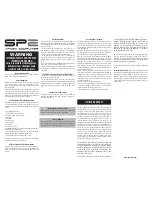
17
2 USE
2.1 IMPORTANT RECOMMENDATION
♣
Failure to observe the procedure described below risks causing a dangerously high
voltage for the operator on the clamp’s output and causing damage to the clamp.
♣
Do not clamp onto a conductor before connecting the clamp to the relevant measuring
instrument. Also, do not disconnect the measuring instrument while the clamp is still
gripping the cable.
♣
Ensure that you keep the gap perfectly clean
♣
Do not "click" the jaws together so as to avoid damaging the jaw faces.
2.2 METHOD OF OPERATION
Proceed as follows:
1.
Connect the cable from B102 clamp’s outlet to the multimeter paying careful attention to
the polarity.
2.
Select the more appropriate rating on the clamp (P1, P2) and the appropriate size of
receiver for the output signal, which must be adequately insulated.
Position on
image
Selector switch position
Readout
P1
400 A or 1 mV/A
400 mV for 400 A or 1 mV per A.
P2
4 A or 1000 mV/A
1 mV for 1 mA or 1000 mV per A.
Figure 8
: Reminder of the selector switch’s positions.
3.
Open the jaws and clamp either the conductor whose current is to be measured or the
various conductors for the differential current measurements.
Ensure that the clamp is correctly closed (no foreign body in the gap).
Carefully observe the direction of the arrow, if the application requires this (source at the base of
the arrow, receiver at the tip) mainly for mains system or power analysers.
4.
Determine the current in the conductor by applying the appropriate readout coefficient to
the measured value according to the rating selected on the multimeter and the clamp’s
sensitivity.
















































